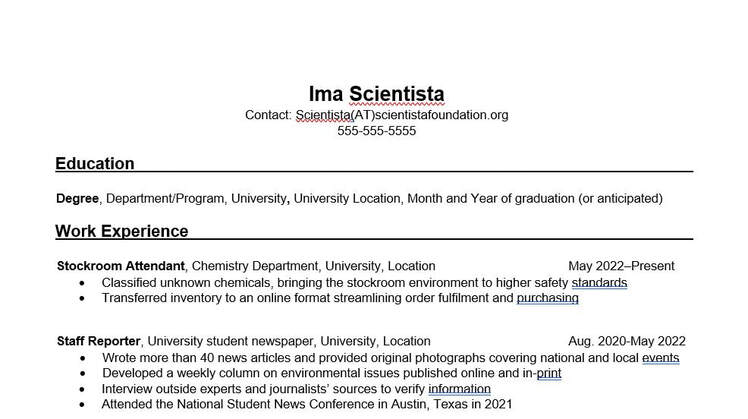|
by Deanna Ratnikova, American Physical Society Edited by Lauren Koenig (an earlier version of this article was originally published on 12/10/2012) As you start to prepare for summer research and internship applications, you're probably thinking about how to craft the best resume to help you stand out from other applicants. If you're building a resume from scratch, it might seem intimidating at first — but laying the groundwork now will set you up for long-term success and make life easier for your future self! As you progress through your career, you can add accomplishments, awards, and more, so that it's easy to apply to any open position when the time comes. Fortunately, there are a a ton of resources and resume templates out there. Your university's career center may also offer resume feedback services. No matter the format you choose, we suggest some recommendations below that apply to all types of resumes.
What goes into a resume? Several items are fairly basic on all resumes — contact information, education, and work experience — but the rest of the content depends on you and the position you are seeking. If you are applying for a research position or internship that will require specific knowledge or skills, you may want to include relevant coursework, research-related publications, and technical skills related to the position. Additionally, if you have impressive awards or educational accomplishments, you may want to include a section to feature these honors. How long is a resume? You should aim to keep your resume at one page, two at the most. Beyond that length, you are looking at a curriculum vitae (CV) which would include all of your publications, awards, conference presentations, and more. CVs are typically only requested for academic and professional research positions, so you shouldn’t worry about creating a CV until you’ve started graduate school. How is a resume organized? The layout and presentation of the resume is essentially up to you. It’s a good idea, however, to put your contact information at the top and to have clear headers for each section. In most cases, you will list your education and work experience in reverse chronological order (which means starting with your present situation and working backwards). Also, keep in mind that although the layout may be compact to keep your information on one page, it has to be easily readable. The font should be no smaller than 12 point and, you should avoid any dated or difficult-to-read font. Additionally, try to work in plenty of “white space” (a.k.a. portions of the page without text). White space can help create a more attractive resume, and by making sure you include it, you will force yourself to narrow down which content is most relevant to the position you are seeking. What else should I know? Many people use the work experience section to display the duties or responsibilities their position involved —try instead to highlight your accomplishments and other quantifiable results. Remember to use action verbs to describe what you did and how you made a difference for the employer. A few items you should avoid listing on your resume include birth date, marital status, number of children, and hobbies. Personal information may detract the reviewer’s attention away from what really matters — your skills and qualifications for the position! Also, unless requested, references should not be included, as well as the statement “references available upon request”. Lastly, ask friends and family to look it over for errors. If you’ve been working on your resume for any length of time, you’re likely to overlook a mistake. A fresh set of eyes will help you avoid an embarrassing and costly error. You may also want an advisor to take a look to make sure you’ve included the most relevant information for the position (assuming the position you’re applying for is within the field of your advisor—otherwise, seek out someone who has experience in that field). And, if possible, create a copy of your resume in PDF format; this will ensure that the reader is seeing your resume as you made it. Depending on the job application, you may also want to provide a cover letter or a link to a personal website or portfolio. The information you can include in these materials can complement one another or be used to structure a personal narrative about your skills, experience, and goals — so plan ahead to think about how you can make the best use of each to highlight your strengths. Looking for more advice? Check out some of our past content about writing resumes and cover letters.
0 Comments
Your comment will be posted after it is approved.
Leave a Reply. |
CONNECT WITH USSUBSCRIBE |
The Scientista Foundation, Inc. All Rights Reserved © 2011-2021 | Based in NY | [email protected]
The Network for Pre-Professional Women in Science and Engineering
The Scientista Foundation is a registered 501(c)(3) -- Donate!
The Network for Pre-Professional Women in Science and Engineering
The Scientista Foundation is a registered 501(c)(3) -- Donate!



 RSS Feed
RSS Feed